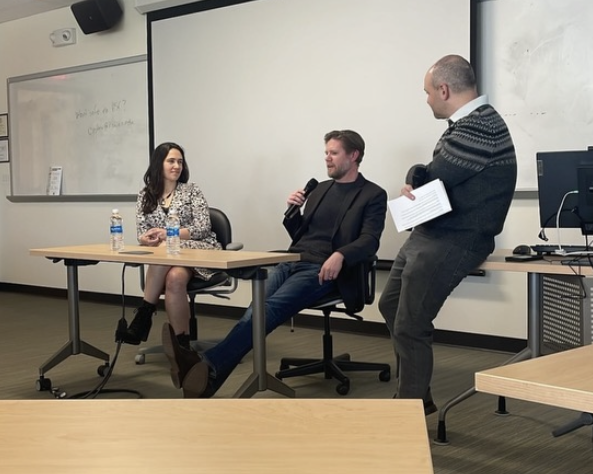
On March 26, environmentalists Virginia Schutte and Andrew S. Lewis spoke at Rowan University about careers in science communications and environmental journalism to students.
Virginia Schutte is a science media specialist and principal at Real Life Science Media. She earned her Ph.D. in ecology in 2014 from the University of Georgia. Schutte has won awards for her work in the field and has created and led digital engagement programs, designed communications strategies, and trained scientists how to identify and meet their communication goals.
In the early years of her career, Schutte realized she did not want to write about science, but write about and teach science communication. Schutte has been a freelancer since 2019.
“I like to experiment with what science media can be,” Schutte said. “I do not think of myself as a translator or someone who is tied to science,” Schutte said, explaining how she thinks about herself in her career. She emphasized that she plays different roles in different jobs, and how at her core she is a communicator.
Andrew S. Lewis is an environmental journalist whose work has been featured in The New York Times, Yale E360, Outside Magazine, and NJ Spotlight News.
Lewis went to school in California where he could continue his lifelong love of surfing and write about the topic. In doing so, he has been able to travel all over the world. In the late 2000s, politicians began talking more about climate change and the environment, which Lewis had witnessed in his travels. He then went to Columbia University and got his master’s in nonfiction writing, and how he is writing about the environment.
“The environment impacts everyone,” Lewis said. He also explained how writing about the environment allows him to tell the stories of everyday people.
In response to why she enjoys writing about the environment, Schutte responded, “A career where I still get to know the ocean very intimately and tell people about it, that’s why I do it.”
“I’m not sure we can call ourselves one thing anymore… there has to be this willingness to be flexible and tell stories,” Lewis said. He describes himself as a journalist, writer, and producer.
Lewis said that if anyone considers themselves a journalist, they have to be curious and always be looking for stories, and then apply their own interests to it. For him, it is the environment, so he is always looking for that angle and looking to create longer pieces out of stories. Lewis also noted the importance of talking to people and keeping in touch with sources.
Lewis and Schutte talked about their differences in how they tackle their writing and various projects. Lewis said he takes his time writing and searches for stories, while Schutte finds stories through her established connections with people.
They then transitioned into talking about the business side of things, how to market themselves, and how to look for jobs in the field.
“Most of my jobs have come from my relationships with people,” Schutte said. She went on to explain how people she has met and become friends with have contacted her years later to work on projects with them.
Schutte also has a podcast, is a co-founder of her own company in science communications, and runs online courses.
Lewis said one way he receives funding for his travels is through the Pulitzer Center. He also uses FERN to connect with publications and editors.
“I feel like I’m constantly standing at the edge of a cliff and waiting for things to crumble around me,” Schutte said about her career.
It has taken her places where she never thought it would, and is something that is constantly changing. Lewis talked about how, as a writer, he has developed a thick skin and learned a lot from people’s feedback on his work throughout his career.
Lewis advised the audience to subscribe to news outlets that cover topics that they are interested in as a journalist and writer. He said his own media diet consists of hyperlocal publications, such as South Jersey Climate News, an online publication started by two professors at Rowan.
“I would never ever call myself a journalist because I am 100% biased…I don’t consume the news because it is too much,” Schutte said.
She said that she gets most of her news from social media because she can find hubs of information. Schutte also said that she usually goes on social media with a timer and a goal to protect her mental health and her time.
One student, senior Isaac Linsk, asked the speakers how they have navigated changing technologies throughout their careers, specifically artificial intelligence.
Schutte talked about how AI charts specific data, and how she uses ChatGPT in her work to write things out as a first draft and then edit it herself. Lewis talked about how it is important to stay on the pulse of changing technologies, and how he is interested to see how AI will make certain scientific explorations easier.
“I would say the most treacherous thing going into the field as a young journalist is knowing your worth. Do not do free work. Understand your worth as a writer and be confident in that. Don’t make a habit of writing for nothing,” Lewis said when asked what advice he would tell students about to graduate.
He also told the audience not to be afraid to pitch stories to editors, because the worst they can say is no. Schutte gave similar advice, saying that you are starting with a no by not asking.
“I know how to bring people along for the journey, not just tell them some facts,” Schutte said.
For comments/questions about this story DM us on Instagram @thewhitatrowan or email thewhit.newseditor@gmail.com





